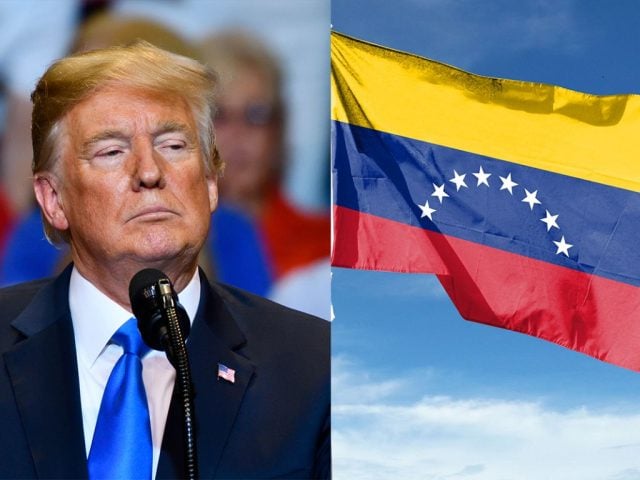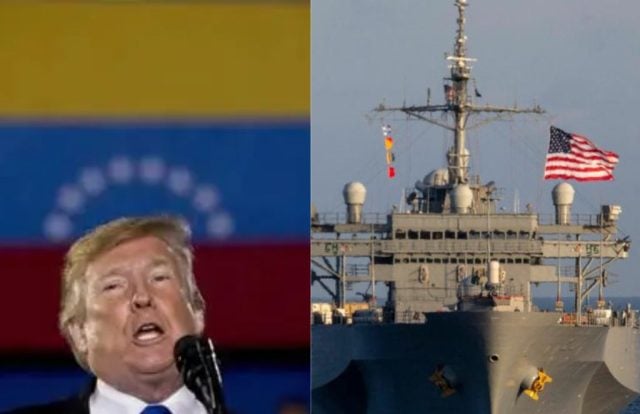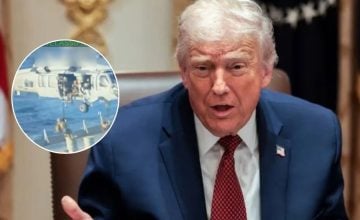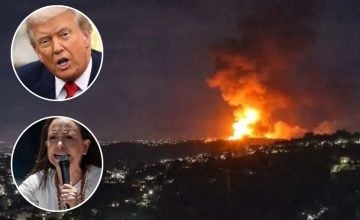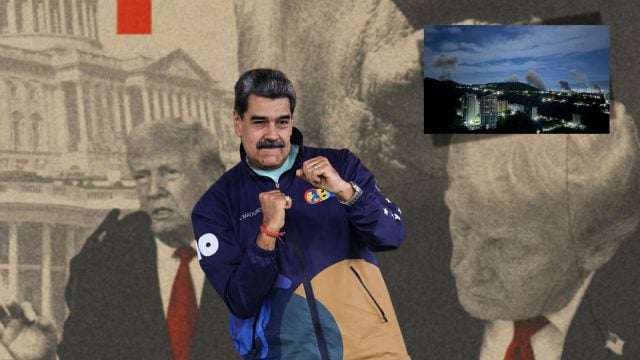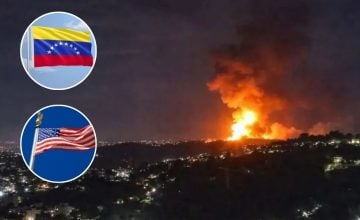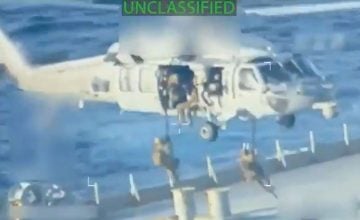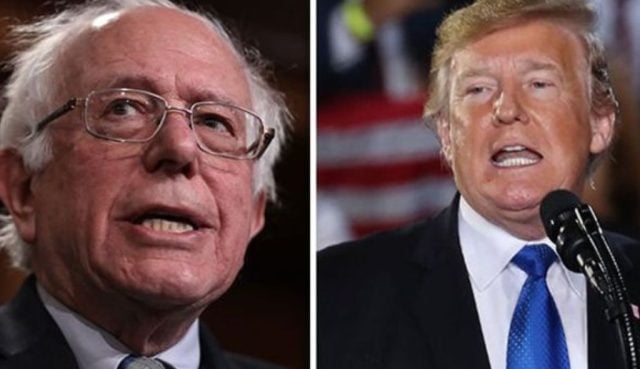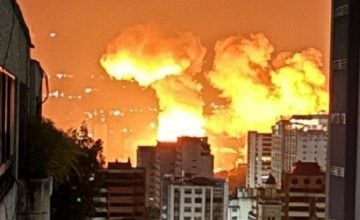Original article: Con los ojos en el petróleo: Trump no descarta invadir Venezuela mientras mantiene la mayor presencia militar en décadas
With eyes on the world’s largest certified oil reserves, U.S. President Donald Trump asserted that Washington must «address» Venezuela, leaving the possibility of military intervention on the table.
«I don’t rule it out. I don’t rule anything out. We just have to take care of Venezuela,» Trump stated to the press amidst the most significant U.S. military deployment in the Caribbean in decades.
Washington’s strategy is outlined under the operation ‘Southern Spear‘, announced by Defense Secretary Pete Hegseth, citing the need to continue its offensive against drug trafficking, escalating tensions in the region.
«This mission defends our homeland, eliminates narco-terrorists from our hemisphere, and protects our country from the drugs that are killing our people,» Hegseth indicated in a message shared on X, noting that actions will be coordinated by a joint task force and Southern Command, responsible for U.S. military operations in Central and South America.
While details about the scale of the operation remain unclear, the announcement coincided with the arrival of the most advanced aircraft carrier in the U.S. fleet, the USS Gerald R. Ford, accompanied by its strike group—over 4,000 Marines and dozens of aircraft, additional warships, a nuclear submarine, and F-35 fighter bombers.
The Pentagon has also reinforced its forces in Puerto Rico, deployed ground troops in Panama—the first time in over two decades that U.S. Army units have been sent to that country—and conducted exercises in Trinidad and Tobago, located merely 11 kilometers from Venezuela’s coast.
The Largest U.S. Military Presence in Latin America and the Caribbean in Decades
These actions come amidst rising tensions between the U.S. and Venezuela following the Trump administration’s decision to deploy warships, submarines, combat aircraft, and troops in the Caribbean Sea near Venezuelan shores since August.
Thus, the U.S. maintains its largest military presence in the region in decades—a measure that the White House justifies as part of its fight against drug trafficking.
Since then, Washington has carried out several missile strikes in international waters of the Caribbean and Eastern Pacific against boats that Trump has accused of allegedly transporting drugs, without providing evidence, an offensive that has reportedly resulted in at least 80 fatalities.
The White House characterized the deployment of U.S. military personnel in the area as part of a strategy “to stop the drugs aiming to flood the United States and to bring those responsible to justice.”
However, the UN Office on Drugs and Crime (UNODC), as well as the U.S. Drug Enforcement Administration, have stated that Venezuela is not a primary drug trafficking hub, noting that approximately 87% of cocaine reaches the U.S. via the Pacific route. This assessment casts doubt on the very basis of the military campaign ordered by Trump.
At the same time, the Republican magnate has accused Venezuelan President Nicolás Maduro, without proof or substantiation, of leading an alleged drug trafficking cartel, prompting U.S. Attorney General Pam Bondi to double the reward for information leading to his arrest.
In mid-October, Trump admitted to authorizing the Central Intelligence Agency (CIA) to conduct covert operations in Venezuelan territory, to which Maduro responded: «Can anyone believe the CIA has not been operating in Venezuela for 60 years? Can anyone believe the CIA has not conspired for 26 years against Commander [Hugo] Chávez and against me?».
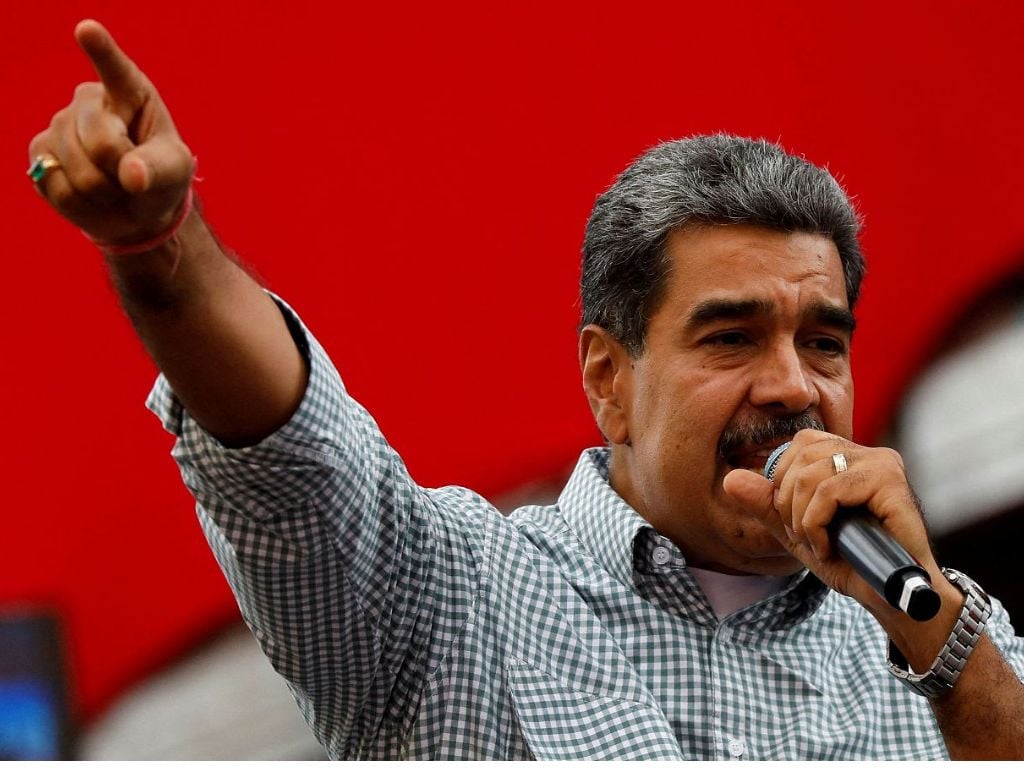
Maduro Claims Trump Seeks to Impose a «Puppet Government» and Loot Venezuela’s Resources
The Venezuelan leader has denounced a «multifaceted war» orchestrated from the United States, which includes armed aggressions, disinformation campaigns, and covert operations.
In September, the Bolivarian National Armed Force (Fanb) initiated military exercises in coastal areas to reinforce the defense of the Caribbean nation against external threats.
Maduro also accused Washington of leading an offensive to impose a «puppet government» and carry out an invasion aimed at controlling Venezuela’s vast natural resources, including oil, gas, and gold.
The Venezuelan president has raised alarms about the «resurgence» of the Monroe Doctrine, which aims to force «regime changes» in the region, advocating instead for the «Bolivarian Doctrine in defense of independence, unity, and the emancipation of our peoples,» urging Latin American leaders to unite to «demand an immediate halt to military attacks and threats.»
International Criticism of the U.S. for Escalation Against Venezuela
The escalation against Venezuela has generated strong international condemnation. Russia, the UN High Commissioner for Human Rights, and the governments of Colombia, Mexico, and Brazil have expressed their rejection of actions taken from Washington.
Russian Foreign Minister Sergei Lavrov stated that Moscow considers Washington’s actions unacceptable, which «without trial or due process» intercepts ships under the pretext of carrying drugs. «This is how countries operating outside the law act, those who see themselves as above the law,» said the minister.
«The line that the Trump Administration has chosen regarding Venezuela will lead to nothing good. It will not improve Washington’s reputation before the international community,» he added.
For his part, the UN High Commissioner for Human Rights, Volker Türk, deemed the U.S. attacks on alleged ‘narco-boats’ without evidence as «unacceptable,» considering that there is «no legal justification» to support or justify such procedures.
Colombian President Gustavo Petro has described the U.S. attacks as «extrajudicial executions» and has called for an investigation of Trump for war crimes.
Mexico has voiced its opposition to intervention. President Claudia Sheinbaum stated that her country «will never support the intervention of a foreign government in a sovereign nation,» a stance she noted is enshrined in the Mexican Constitution.
Russia has positioned itself as a staunch ally of Caracas, with the State Duma unanimously passing a call to condemn the «aggressive actions» of Washington.
Brazilian President Luiz Inácio Lula da Silva has offered to act as a intermediary to «seek acceptable solutions for both parties» and, in his recent address to the UN General Assembly, urged to keep Latin America and the Caribbean as a zone of peace, emphasizing the priority for the continent to be «free of weapons of mass destruction» and ethnic or religious conflicts.
«The most effective way to fight drug trafficking is to cooperate to suppress money laundering and constrain arms trade,» the Brazilian president indicated, while condemning the «use of lethal force in non-armed conflict situations.»
Conversations with Maduro or Troops Ready to Invade Venezuela?
In recent statements to the press, Donald Trump also mentioned the possibility of holding conversations with Venezuelan President Nicolás Maduro.
«I will probably speak with Maduro, I talk to everyone,» he stated.
However, U.S. Army Secretary Daniel Driscoll admitted that Washington is prepared to deploy ground forces in Venezuela at any moment.
«I believe President Trump and Secretary of War Hegseth have spent a lot of time considering what is best for the American people,» he affirmed in comments to CBS, highlighting that, from the «Army’s perspective, […] we have a lot of training in that part of the world,» referring to the reactivation of military exercises in the Panamanian jungle.
«We would be prepared to act according to whatever the president and the secretary of war needed,» Driscoll assured, as reported by RT.
